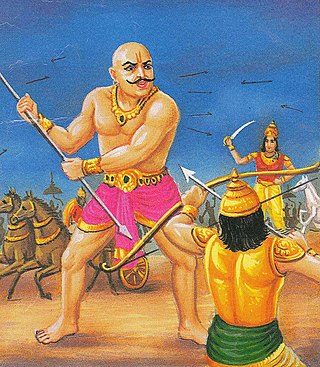
Ghatotkacha is a prominent character in the story of Mahabharata. His name comes from the fact that his head was hairless (utkacha) and shaped like a ghatam, or a pot. Ghatotkacha was the son of the Pandava Bhima and the demoness Hidimbi, and thus a half-human, half-demon hybrid.

Daana Veera Soora Karna is a 1977 Indian Telugu-language Hindu mythological film co-written, produced and directed by N. T. Rama Rao under his banner, Ramakrishna Cine Studios. Based on the life of Karna from the Mahabharata, it stars Rama Rao in three roles: the title character, Duryodhana, and Krishna. It also stars Rao's sons Nandamuri Harikrishna and Nandamuri Balakrishna, who play the roles of Arjuna and Abhimanyu, respectively. Music for the film was composed by Pendyala Nageswara Rao.
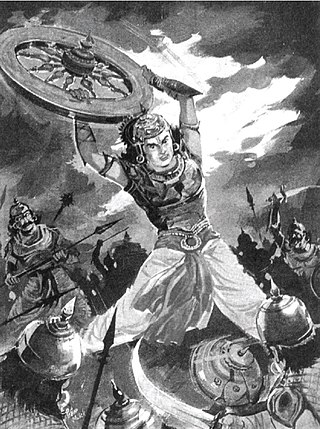
Abhimanyū is a warrior from the ancient Hindu epic Mahabharata. He was the son of Arjuna, the third of the Pandavas and the hero of the epic, and Subhadra, the younger sister of the revered Hindu deity Krishna. Abhimanyū is portrayed as a young, strong and talented warrior. He was also one of the few individuals, along with his father, who knew the technique to enter Chakravyuha, a powerful military formation.

Mayabazar is a 1957 Indian epic Hindu mythological film directed by K. V. Reddy. It was produced by Nagi Reddi and Chakrapani under their banner, Vijaya Productions. The film was shot simultaneously in Telugu and Tamil, with a few differences in the cast. The story is an adaptation of the folk tale Sasirekha Parinayam, which is based on the characters of the epic Mahabharata. It revolves around the roles of Krishna and Ghatotkacha, as they try to reunite Arjuna's son Abhimanyu with his love, Balarama's daughter Sasirekha (Savitri). The Telugu version features Gummadi, Mukkamala, Ramana Reddy, and Relangi in supporting roles, with D. Balasubramaniam, R. Balasubramaniam, V. M. Ezhumalai, and K. A. Thangavelu playing those parts in the Tamil version.

Missamma is a 1955 Indian Telugu-language romantic comedy film directed by L. V. Prasad. It was produced by Nagi Reddi and Chakrapani on Vijaya Productions banner. The film stars N. T. Rama Rao, Savitri, Akkineni Nageswara Rao and Jamuna. The script was adapted by Chakrapani from Rabindranath Maitra's Bengali play Manmoyee Girls School. It revolves around two unemployed people — M. T. Rao and Mary — who pose as a married couple to obtain employment in a high school founded by Gopalam, a zamindar. As Rao and Mary fall in love, Gopalam's nephew A. K. Raju learns that Mary is Gopalam's missing elder daughter Mahalakshmi; she is unaware of her true identity.
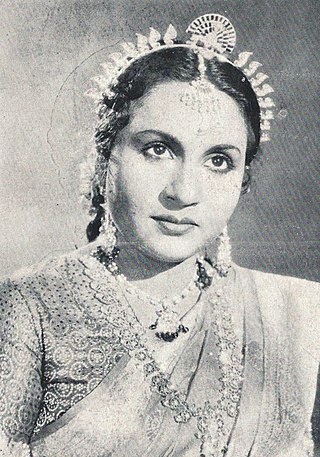
Santha Kumari was an Indian musical artist and actress. She was married to the Telugu film director and producer P. Pullayya.

Kadiri Venkata Reddy was an Indian film director, screenwriter, and producer who primarily worked in Telugu cinema. He is regarded as an influential director in South Indian cinema. He directed 14 feature films and won three National Film Awards and a Filmfare Award South.

Lava Kusa is a 1963 Indian Hindu mythological film directed by C. S. Rao and his father C. Pullayya. The film was scripted by Sadasivabrahmam, Samudrala Sr. along with C. S. Rao and C. Pullayya. The film was produced by Sankara Reddy under Lalita Sivajyothi Films. Lava Kusa is the first full-length colour film of Telugu cinema.
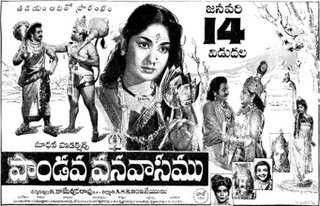
Pandava Vanavasam is a 1965 Indian Telugu-language Hindu mythological film directed by Kamalakara Kameswara Rao and written by Samudrala Sr. It stars N. T. Rama Rao and Savitri, with music composed by Ghantasala. It was produced by A. S. R. Anjaneyulu under the Madhavi Productions banner. The film was a major box office success, running for 175 days in theatres.
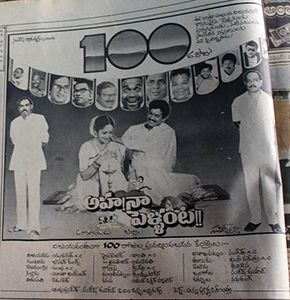
Aha! Naa Pellanta!! is a 1987 Indian Telugu-language comedy drama film written and directed by Jandhyala, and produced by D. Ramanaidu under his banner Suresh Productions. The film stars Rajendra Prasad and Rajani while Kota Srinivasa Rao, Nutan Prasad, and Brahmanandam play supporting roles. The film has music composed by Ramesh Naidu. An adaptation of Adivishnu's novel Satyam Gaari Illu, the film's title is based on a song from the epic fantasy film Mayabazar (1957). The film released on 27 November 1987.
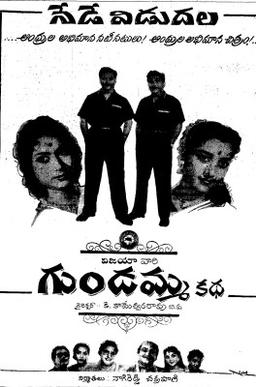
Gundamma Katha is a 1962 Indian Telugu-language comedy drama film directed by Kamalakara Kameswara Rao and co-produced by Nagi Reddi and Chakrapani under their banner Vijaya Productions. It stars N. T. Rama Rao, Akkineni Nageswara Rao, Savitri, and Jamuna, with S. V. Ranga Rao, Suryakantham, and Ramana Reddy in supporting roles.

Donga Ramudu is a 1955 Indian Telugu-language drama film co-written and directed by K. V. Reddy. It stars Akkineni Nageswara Rao, Savitri, Jamuna, and Jaggayya with music composed by Pendyala. The film was produced by D. Madhusudhana Rao under the Annapurna Pictures banner.
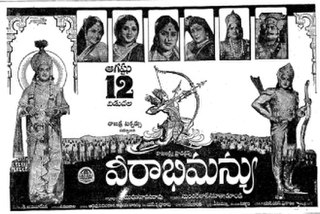
Veerabhimanyu is a 1965 Indian Telugu-language Hindu mythological film produced by Sunderlal Nahta and Doondi and directed by V. Madhusudhana Rao. It stars N. T. Rama Rao, Shobhan Babu and Kanchana, with music composed by K. V. Mahadevan. The film was recorded as a Super Hit at the box office. It was simultaneously filmed in Tamil as Veera Abhimanyu, with slightly different cast. The film had its climax scene shot in Eastmancolor. The film is considered a breakthrough for Shobhan Babu.
Sasirekha Parinayam is an Indian folktale based on oral traditions popular in Telugu States. While it uses characters who appear in the Mahabharata, the story is not present in the epic. The plot concerns the marriage of Sasirekha, called Vatsala in some versions, the daughter of Balarama, to Abhimanyu, the son of Arjuna. It echoes the marriage of Arjuna to Subhadra in the Mahabharata.

Sri Krishnarjuna Yuddhamu is a 1963 Indian Telugu-language Hindu mythological film, produced and directed by K. V. Reddy under the Jayanthi Pictures banner. It stars N. T. Rama Rao, Akkineni Nageswara Rao and B. Saroja Devi, with music composed by Pendyala Nageswara Rao. The film was based on the Telugu play Gayopakhyanam written by Chilakamarti Lakshmi Narasimham in 1890. It was later dubbed into Kannada and into Tamil.

Pellinaati Pramanalu is a 1958 Indian Telugu-language comedy drama film, produced and directed by K. V. Reddy. It stars Akkineni Nageswara Rao and Jamuna, with music composed by Ghantasala. The film was simultaneously made in Tamil as Vaazhkai Oppandham with a slightly different cast that released the following year.
Gali Penchala Narasimha Rao (1903–1964), also known as Gali Penchalayya, was an Indian film music composer. He was a representative of the first generation of music directors in Indian cinema. He debuted with the Telugu version of Seetha Kalyanam in 1934. Sri Krishna Leelalu (1935) was another musical hit of his. His music has contributed to the success of Balaraju (1948). The songs Cheliya Kanarava by Ghantasala and Evarine Nenevarine by S. Varalakshmi were the melodies which attracted many those days.

Mahiravana is a 1940 Indian Telugu-language film directed by Chitrapu Narayana Rao and produced by Ghantasala Balaramayya under the banner of Kubera Films. Veteran actor Vemuri Gaggayya played Ahiravan.
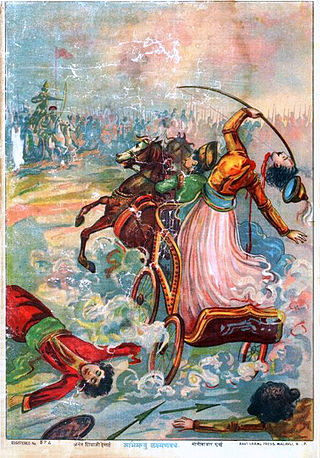
In the Hindu epic Mahabharata, Lakshmana Kumara, also rendered Lakshmana is the son of king Duryodhana and queen Bhanumati and a grandson of Dhritarashtra and Gandhari. He is described to have a twin sister called Lakshmanā, who is kidnapped by Samba, a son of Krishna. He is slain on the thirteenth day of the Kurukshetra War by Abhimanyu, who decapitates him using an arrow.
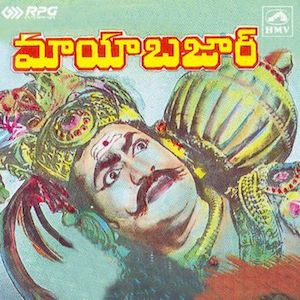
Mayabazar: Music from the Motion Picture is the soundtrack album of the 1957 Indian bilingual film of the same name which was simultaneously shot in Telugu and Tamil. Ghantasala composed the album and the background score for the film. The soundtrack album features 12 tracks, whose lyrics were penned by Pingali Nagendrarao and Thanjai N. Ramaiah Dass for the Telugu and Tamil versions respectively.

















